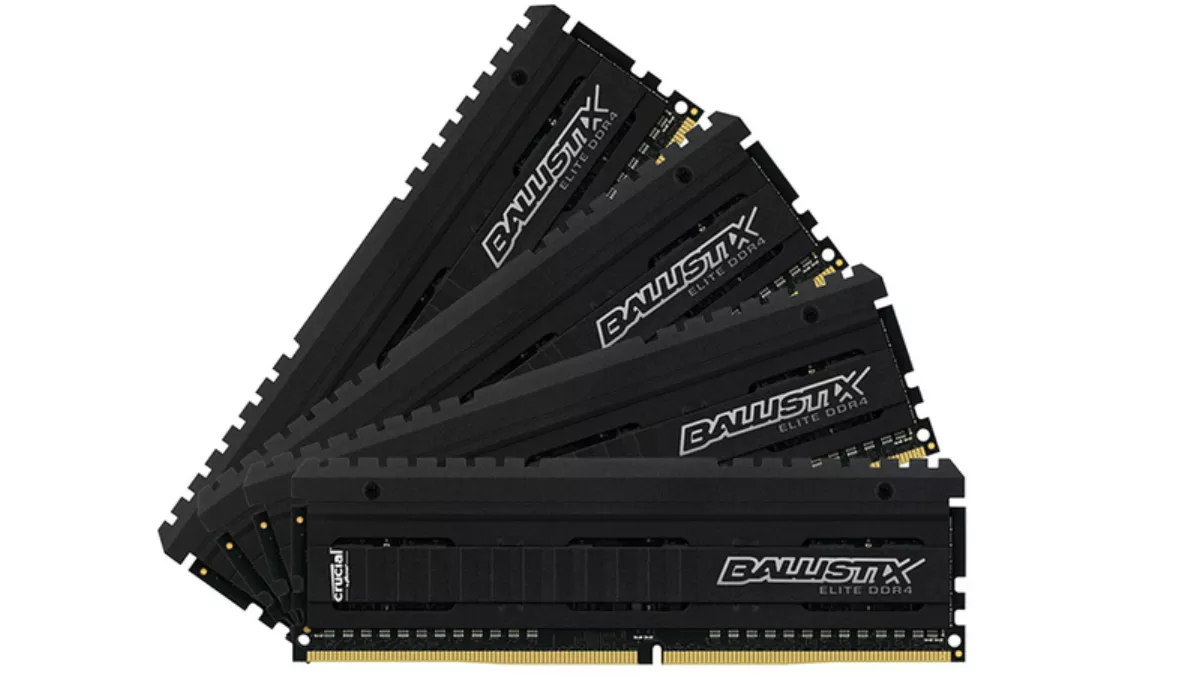Five signs it may be time for a memory upgrade
For years I've been listening to PC owners lamenting to me about how their PC has a "virus" or that their CPU needs replacing due to poor performance. My first question, before they go and spend hundreds of dollars on a new machine, is "have you considered upgrading your RAM?".
Back it the day, a couple of gigabytes of memory would have done you. In fact, a couple of gigs would've been all you PC could actually use. With modern 64-bit operating systems like Windows 10, sky's the limit (or more likely 64 GB) when it comes to the amount of RAM you have in your machine. The more RAM, the more applications, and better games, you can have running without your PC grinding to a halt.
When Crucial recently surveyed 2,000 PC users, the company learned that it takes users just 60 seconds on average before they lose their temper over a slow or frozen computer – something experienced by around half of all computer users on a daily to weekly basis.
Jim Jardine, Director of DRAM Product Marketing at Crucial explains, "Memory is one of the most critical components in your computer, allowing your system to perform many of its everyday tasks, such as browse the Web, edit an Excel spreadsheet, or experience the realism of the latest game. And yet, the problem of insufficient memory can be overlooked – or worse, not identified in the first place.
Most of your computer woes when things slow down are caused by memory issues and not your CPU. Programs need RAM to run efficiently, or they start inefficiently cashing data to hard drives. Not what you want when you are playing a game or working on an important project.
Jardine adds, "The signs are found in the most common programs we run day-to-day, so you'll be able to identify them quickly. Here's five things to keep an eye out for. Firstly, do you have to wait for letters and words to appear as you type? This is a clear sign that you're in need of additional memory. Upgrading from 2GB to 4GB can reduce the loading time and reduce the chances of your computer freezing. If you frequently use word processing or spreadsheet software, upgrading to 8GB can provide improved responsiveness and diminish the chance of your computer freezing.
In our connected world it's not unusual to have multiple tabs open on your browser whilst writing a document on even playing a video. Business users and enthusiasts that have discovered the massive leap in productivity (and gaming enjoyment) you get from multiple monitors, may have quite a few office applications, a web browser and even a game all running at the same time.
According to Jardine, a memory upgrade can also improve your internet experience, "Is there a lag between clicking to open a new browser tab and the moment it opens? This is common with web browsers, as they use so much active data. Increasing memory from 2GB to 4GB can speed up the responsiveness, and up to 8GB can greatly improve responsiveness. It's worth noting that memory won't affect the speed of your internet connection, but it will run more efficiently.

Video playback problems can be a sign that your memory may be holding things back, as Jardine says, "Are you experiencing choppy or frozen playback when you stream video? Like web browsing, streaming video relies on internet speed, but your computer needs enough GBs of memory to run everything in the background while streaming video. 4GB memory can reduce the risk of choppy or frozen playback. 8GB can improve multitasking and reduce playback problems.
A great gaming experience will suffer if you lack the memory in your system. Jardine continues, "Do you frequently find yourself waiting for your commands to be executed during game play? Many games require at least 4GB of RAM to run, but it's recommended to install at least 8GB to run them well. There's nothing worse than losing a kill streak on COD because your computer is struggling to keep up – install 8GB of RAM to start with and scale up to 16GB if necessary.
Productivity applications, especially image and video editors require more memory than ever. Many of us are now capturing video at 4K (even on our smartphones) and taking photos in the region of 40MP. These resolutions would have been unheard of outside of high-end production facilities.
Crucial's Jardine elaborates, "Photo and video editing apps, such as Photoshop and Final Cut, require more system resources than many other kinds of software, and, while system requirements may call for less, if you don't have at least 8GB of RAM, your computer may not be able to run them at all. These applications flood your system with active data - the data your computer regularly or continuously accesses – so you need enough GBs of RAM to hold it all.
It is easy to overlook a memory issue and, as I said in the beginning, blame it on virus or your CPU.
Jim Jardine concludes, "The next time you're working on a spreadsheet, streaming video or gaming, keep an eye open for the above signs and, if you spot them, take action to install the memory that best fits your needs. A system scan quickly reveals compatible memory for any computer, helping even the most casual of users to make slow load speeds and freezing a distant memory.
Frustrating PC problems can be fixed relatively easily using online tools like Crucial's system scanner to check your system and suggest compatible memory upgrades. Look out for FiveFive's review of Crucial's latest, affordable, 16GB Ballistix Elite 3600 memory upgrade, soon.


